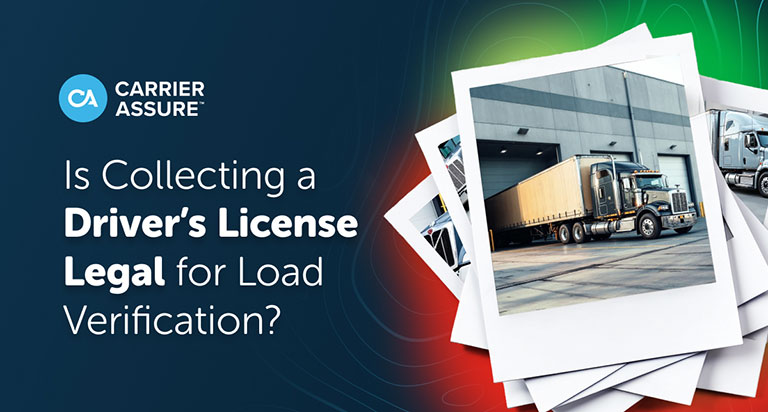New freight threats seem to pop up as fast as new car washes open. Between cargo theft, double brokering, and identity spoofing, freight brokers are under pressure to not just move loads, but also protect them.
A logistics broker recently reached out with a smart question:
“We’re collecting pictures of the side of the truck, VIN, license plate, and driver’s license for high-risk commodities. We send them to the shipper for load verification. Are there any legal issues with this?”
This is something many brokers are now experiencing. It’s no surprise that teams are taking extra steps to verify who’s actually showing up to load the freight. But when you start requesting and sharing personal and vehicle data, it’s fair to ask: are we still on solid ground, legally?

Why logistics brokers are collecting these photos
Freight brokers and shippers moving targeted commodities are tightening security, because fraudsters are getting smarter. It’s now more common than ever to ask for:
- A photo of the side of the truck (branding, DOT number)
- The VIN
- The license plate
- The driver’s license
All of these help verify that the person and equipment at pickup match the information provided. It’s a move to prevent unauthorized pickups and build trust with shippers. But there’s a big difference between “common” and “compliant.”
Is it legal to collect and share this info?
Short answer: yes… but it comes with responsibility.
1. You can collect this info with consent
None of the photos you're asking for are illegal to request. But a driver’s license is considered Personally Identifiable Information (PII), meaning you need to handle it carefully.
The best practice would be to get explicit written consent from the carrier (email or form is fine). If they’re willing to provide the information, you’re off to a solid start.
2. Treat the information like sensitive data
Even if it’s "just a photo," all this information adds up. Be smart about who on your team has access, how long you store the info, and whether it gets shared beyond the shipper, which should NOT be the case.
3. Sharing information with the shipper? Add a disclaimer
You’re doing this to protect the shipper, but that doesn’t mean they can handle the data however they want. It's smart to include language that makes your expectations clear. For example:
Attached are driver and vehicle photos for load verification. Please treat this information as confidential and use it solely to confirm the identity of the driver prior to loading. We ask that you store or delete it in accordance with your company’s data privacy practices.
4. Watch out for state-specific laws
Federal law doesn’t prohibit this practice, but states like California (under CCPA) and Illinois (under BIPA) have stricter privacy rules. If you’re collecting information from drivers based in those states, or operating through them, you may need to go a step further.
Consider adding language like this to your request email:
As part of our enhanced security process, we collect photos of the truck and driver’s license to verify identity and aid in cargo loss prevention. This information is only shared with the shipper and is securely deleted after the shipment is complete. By providing this photo, you consent to this limited use.
5. Be consistent to avoid discrimination claims
Don’t apply this process selectively. If you only ask for photos from certain carriers or in certain scenarios without a clear policy, it could open the door to claims of unfair treatment.
Apply it consistently to all carriers handling high-value or high-risk freight.
—---
Collecting this info is a smart and increasingly common practice. It shows you’re serious about cargo security and doing your part to prevent fraud. But it’s on you to make sure your process holds up under scrutiny.
Disclaimer: This is not legal advice. This is general guidance based on industry best practices and experience handling thousands of high-risk shipments. If you’re unsure, get your legal team involved.
Want to verify carrier performance before they even show up?
Carrier Assure’s carrier vetting software scores trucking companies and helps you verify operational activity and carrier performance, so you can spot red flags before you ever request a photo.






